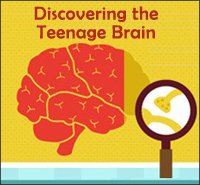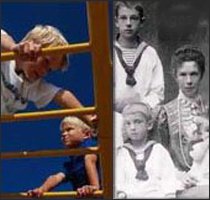
Adolescent and Teen Development: Physical, Cognitive and Social Milestones
Ah, the teen development years! Yes, they had to come and now they are here!
The teen years may feel like a challenging time for both you and your child. As you probably already know very well, these years are marked by a lot of transitions that can sometimes be overwhelming, especially as physical, emotional, and cognitive changes work together to push your adolescent into adulthood.
- So, perhaps you're here wondering what kind of adolescent development your teen going through!
- Or perhaps you're wondering how to approach your teen and how to be the best parent you can be!
Whatever the case, you've come to the right place! :-)
Here I will provide you with insights into both the concrete development stages (you can follow the links below if you like) or you can read on chronologically for more overall psychological parenting insights about teen development.
The Teen Challenge of Balancing the Opposing Needs for Being Both Autonomous and Dependent All at Once

As we all probably know (at intuitively), both relationships and autonomy are necessary for healthy development: Everybody needs to feel that they have some degree of say in what happens to them yet most people realize that they cannot function independently of others.
But the task of balancing these two things - learning how to be an individual while also building connections with others - can be one of the most difficult jobs of adolescence.
It is not easy wanting to be autonomous while still realizing that you need relationships for support and connection.
Therefore, this teenage age and stage of adolescent development can be one of the most conflicting child development stages:
On one hand, teens are working to develop their own identity that is independent from the adults that they have always depended on; yet they are still dependent on not only on parental accept and support, but also struggling to form relationships outside the family.
The Parental Challenge of 'Letting Go' to See Your Teen Grow

While making this transition can be tough on the teen, it can be equally as difficult for the parents.
"Letting go" is not always easy. But, that is the parents' job - to give their children everything they need to become strong, secure, independently functioning adults.
One mother was sharing that her oldest child had moved away to attend university and her other child was travelling the world participating in humanitarian efforts.
When asked if she had a difficult time with her children leaving the nest, her response was, "No."
At the shocked reaction of her friends, she explained further. "Yes, I miss them, but isn't that what we raise them to be able to do? When I see them living independently and fulfilling their purpose in life, I know that I did my job well."
Some may consider this quite a brave statement. After all, as parents, we have invested a lot of years into our children and it may not be easy to change our perspective.
So, the development journey that begins with the 13th birthday and continues until adulthood (about 19) involves finding the precarious balance between holding on and letting go.
It means stepping back and allowing them to experience the consequences of their decisions, yet also knowing when to step-in and come to the rescue.
And, most of all, it means giving unconditional love and support while sometimes "biting your tongue" and keeping your opinions to yourself - unless asked.
Rebellion Is the Natural Manifestation of Self Growth

This is one of the things that makes adolescence development so difficult.
- What we view as rebellion against our authority, our teens view as an effort to gain separation from parental dependence and learn to function on their own.
- What we consider to be disrespect and disregard, our teens may see as a need to change the balance of power.
- What we may consider a bad attitude is in all likelihood a natural progression toward adulthood.
This doesn't mean accepting your teen stepping your lines but it does mean showing tolerance for your teens need to grow into himself which does not necessarily include you.
The essential point here is finding out when your teen is somehow overstepping your space and crossing your boundaries with that exact intent in mind (only to defy you) OR whether your teen is pushing the limits for personal growth which may mean fighting to keep you out of his or her OWN space.
There is a very important difference!
The first one is a lashing out because of anger which should be addressed in order to be able to work something out that is more constructive .
The second one is a natural step in teen development identity building and parental separation which in essence has nothing to do you, the parent.
Daniel Levinson:
Going Through Positive Adult Development
Psychologist Daniel Levinson believed that adolescents must form an identity separate from their family in order to experience what he calls "positive adult development".
For positive adult development to happen, a person must establish relationships with people outside of the family, and these relationships must be strong enough to provide emotional support, and be intimate enough that both parties feel that they are playing an equally important role.
Helping children build a strong sense of self-worth and identity throughout the stages of development is important because they are now equipped with the ability to "redefine" that identity within a broader social environment.
It is like a baby bird - you may feel as if you are pushing them out of the nest, but they must eventually learn to fly unassisted so that they can go build their own nest.
Adolescent development is filled with the most physical, cognitive, emotional, and social changes since infancy.
During this last stage before adulthood, your child will move from a gangly pre-teen to a mature adult that is ready to tackle the world, achieve his dreams, and maybe even consider beginning a family of his own.
Physical Development
Puberty
Girls
Perhaps the most significant physical change experienced during teen development is puberty. Girls will typically begin puberty 2-3 years earlier than boys, however, like with everything else, there are exceptions.
Girls will develop breasts, begin to grow pubic, underarm, and leg hair, and start their menstrual cycles.
They will also experience growth spurts in their early teen years, meaning they are often taller than many boys of the same age.
Boys
Boys will notice the growth and development of genitals, as well as leg, underarm, chest, and even facial hair.
Their voices will change, they will experience nocturnal emissions (wet dreams), and they can expect a growth spurt in their mid to late teens.
Body Image

Because your teen will begin to redefine her identity based on friendships and relationships outside the home, body image is very important.
Natural weigh gain in girls is often not welcomed
Girls will become very self-conscious of weight gain associated with puberty, and it will not be uncommon for them to continually "be on a diet" or trying to "lose a few pounds".
Watch your teen carefully, as this is the age when many eating disorders can develop.
It will not be unusual for your child to compare herself to her peers, judging herself against their physical development or appearance.
If your child struggles with weight, you can encourage healthy eating and exercise habits without making it sound as if this change is necessary for the validation of their worth.
The downside of puberty hormones: spots and oily hair
Acne, oily hair, and body odor are also issues during the development years, so don't be surprised if your teen becomes obsessed with skin care or cleanliness.
They may spend hours getting ready in the morning, and often ask you if their hair looks alright or if the blemishes on their face are obvious.
Sleep

An increased need for sleep is normal
Many parents of teenagers lament the fact that it is very difficult to get their child out of bed in the morning and that he will sleep until noon if left alone.
Well, the good news is, this is not a sign of laziness. In fact, adolescents need more sleep because their bodies are experiencing rapid change and growth.
While sleeping into the early afternoon hours is probably not necessary, your teen will require about 9-10 hours of sleep per night.
Awkwardness and Clumsiness
Physical development is not always a smooth, gradual process. In fact, much change comes in sudden spurts, often leaving your teen awkward, clumsy, and uncoordinated.
Sometimes your child's body will change faster than he can keep up with and he may be uncomfortable about his awkwardness, acne, or excessive sweating.
By giving him unconditional love and helping him find solutions when he asks, you will be equipping him with helpful tools to pass through this challenging teen development phase.
Sexuality

Ready physically but not necessarily emotionally
At some point during these years, your child will become physically mature enough to participate in sexual activity, although they may still be very unprepared on an emotional level.
Many younger teens are unable to differentiate between physical and non-physical intimacy, and will often equate emotional attachments with sex.
Since they are still learning how to weigh consequences and incorporate logical reasoning, they will sometimes make decisions based on what they think is expected rather than their own personal values and beliefs.
For example, your daughter may believe that if she doesn't have sex with her boyfriend, he will end the relationship. Therefore, she may make her decision based on fear of losing something, even if it means compromising her own values.
Try to be welcoming when it comes to talking about sexuality
As a parent, being open and honest with your child and answering the questions they may have about their developing sexuality is optimal.
But as much as you'd like to, you might find it difficult to approach the subject of sex with your teen.
If this is difficult for you (or your teen doesn't want to talk to you about this), try to think if there is someone you know who could be a good mentor regarding sex.
Someone you trust completely and who you feel could answer your teen's questions openly and guide him or her in a good, mature way.
Cognitive Development
Thinking Skills

According to psychologist Jean Piaget it is during this time that teens develop the ability to think logically and abstractly, to consider the outcomes of multiple scenarios, and to look at situations in the light of "possibilities" rather than only concrete "realities".
Reasoning and brainstorming skills
As mentioned, your teen will develop reasoning skills and will begin to consider multiple possibilities or scenarios. In other words, he will be able to ask "what if?" and answer with various options and consequences.
Understanding purely abstract concepts
He will also begin to understand abstract ideas such as morality, philosophy, trust, and faith.
You may notice a new desire to explore spirituality as he studies different faiths or belief systems.
The evolving of this concept is vital to his understanding of where he belongs in the "larger scheme" of things.
As he develops a sense and identity outside of the family, he will feel connected to something beyond himself, whether that be a particular group, cause, or society as a whole.
Meta-cognition
Your teen will also develop what is referred to a meta-cognition, or "knowing about knowing".
He will be able to think about and analyze his feelings and look logically at how he is seen by others.
This form of higher thinking also allows him to devise learning and memory strategies.
Self-Consciousness
Your teen may often overreact or feel as if her every move is being watched and judged. Drama can be expected, and don't be surprised to hear, "You will never understand" or "I wish you would just trust me."
She believes her feelings are unique and she is the only one who has ever experienced such misery.
Reckless Behavior
The 'It can't happen to me' syndrome'
Your teen's thought patterns will often translate into her behavior. Because she often possess a belief known as "personal fable" or "it can't happen to me" syndrome, she may engage in activities such as unprotected sex, drinking and driving, or drug experimentation with the idea that she will not get pregnant, have an accident, or develop an addiction.
She knows the consequences exist and she is able to consider them logically - she just doesn't believe that they will happen to her.
Social Awareness and Responsibility

Strong sense of justice
Your teen may suddenly want to save the baby seals, support a starving child in Africa, or eat organic foods that reduce environmental damage.
Right and wrong will become very important, and he will want to work to restore the balance of justice.
As he works to develop his new identity separate from the family, he will want to become involved in new causes and organizations. This is a way of discovering what he is good at and finding a way to make a difference or impact on the world around him.
If your teen's mindset is orientated towards helping, encourage your child to do volunteer work or community service. She may not stick to any one thing for very long, but she is finding out what she likes and gaining some sense of purpose by learning that she can make a difference.
She may try several things before she discovers something she enjoys all the while having an impact on the world around her.
Social Development
Identity

While establishing an identity is very important in the later childhood stages, it continues to be essential in the development years as adolescents begin a quest to answer the question "Who am I outside of my family environment?"
As they have grown, the influence of parents and significant adults has played a role in their behavior, preferences, and moral perceptions.
In younger years, your child was learning where he belongs within the family. During adolescence, he will discover where he belongs in the world around him.
Commitments are intense but often don't last very long
Your teen may also take a sudden interest in being involved with multiple groups or activities.
However, her interests may change regularly. Today, she may love being in the school play, but next week she may say that she can't wait until she is finished with acting so she can take karate classes.
While you may interpret this as a lack of commitment or "flighty", it is actually her way of discovering her skills and figuring out what she is good at.
You may want to encourage her to stick with something long enough to get an accurate idea of what she likes - or doesn't like - but don't force long term commitments, as this may discourage her from branching out and trying new things.
An important part of teen development and adolescence is exploring career options as your teen begins think about his goals and future. Encourage him to consider all possibilities, and provide him with opportunities to talk with people in various occupations.
Independence and Autonomy
Growing towards being autonomous
Again, your teen is not always being rebellious, but simply trying to figure out what contribution he makes within a relationship.
To engage in healthy relationships, an individual must be able to function as an independent and separate person. That means that he can make his own decisions without the emotional dependence on others, and knows who he is despite changing circumstances and situations.
Identity formation leads to autonomy, and autonomy is necessary for mutually rewarding relationships.

The need for privacy
And, as every parent of a teen knows - privacy is important!
Your adolescent might enjoy journaling because this helps her think about her feelings and evaluate her social relationships, but she will hide her diary in a secret location and will be mortified if you discover it.
She may lock herself in her room and be evasive about her activities. For example, if you ask her where she is going, she may respond with a simple, "Out".
If you ask her with whom, she may say "no one" or "just some friends".
Unless you notice depression, erratic behavior, or a sudden drop in grades, this is probably nothing to worry about. Just because she doesn't want to tell you where she is going, doesn't mean that she is planning on doing something dangerous.
She will be more forthcoming as she realizes that you are willing to let her have some control over her choices.
Distancing from the parents
Your teen may begin to distance himself and spend more time with friends than family.
Regarding emotional development, Jonathan Bradley and Helene Dubinsky of the Tavistock Clinic state:
-
"Teenagers may feel that they have to break away from their family. Fierce battles develop as they complain that all that has been received to date is inadequate and needs to be rejected. This is a time of conflicts, grievances, and the settling of scores.
They often complain bitterly that parents, teachers, and all other authority figures are stopping them from growing up, from asserting their individuality or newly acquired power and still trying to dominate their lives.
As when they were children, teenagers feel a deep suspicion that adults not only have the monopoly of power and sexuality, but conspire to keep teenagers out of it" (Understanding Your 15-17 Year-Old, page 12).
According to Bradley and Dubinski, your adolescent might become argumentative, hostile, and even withdrawn.
He may want to spend a lot of time alone in his room, and will often use phrases such as "Get off my back" or "It's my life." Friends will be more important, and as a parent, you may find it difficult when your teen listens to the advice of peers while disregarding your own.
However, it is important that your teen develop friendships outside the family because it is these relationships that help him form a sense of identity in an adult world.
But, don't worry, he hasn't forgotten your input and influence.
In fact, even though he seems to prefer his friends, he will often defer to your values and still depend on your encouragement and support.
Bradley and Dubinski go on to say that as parents, you:
-
"[Will] be faced with the difficult and often painful task of having to relinquish a degree of control to allow adolescents this new freedom. It may feel painful to let go at this age for various reasons.
Parents may rightly feel that because of immaturity, their teenager is not ready to take on greater freedom and make good use of it.
It can also be very painful to be faced with an adolescent for whom you are no longer the center of the world, and for whom friends and their particular way of life are becoming increasingly influential. In such circumstances, when experiencing teenagers' tendency to turn away and throw themselves into their new world, many parents find it difficult to remember how much their children still need their concern and understanding" (Understanding Your 15-17 Year-Old, page 38).
Intimacy

Close friendships are typically the first opportunity your teen will have to learn how to build open, honest relationships outside the security and acceptance of family.
A child raised in a healthy home will have received unconditional love and acceptance, but it doesn't take very many social interactions for him to learn that not everyone in his life will be so accepting.
Teens struggle with appearance and body image because they believe that this is a condition for acceptance within a group.
They may equate sex with intimacy because they think that physical actions will lead to an emotional connection.
Throughout the teen development years, your child will learn how to function within a relationship and how to develop intimacy on a friendship level. If this is achieved successfully, he will then know how to translate these skills into a romantic relationship.
Parenting Tips Regarding Teens
The teenage development stage is the last phase before adulthood and it is filled with many changes that prepare your adolescent for self-sufficiency and independent functioning within the world outside the family.
As he learns to step away from the security and safety of the home, he will begin to build relationships, discover his identity, and find his place within society. This is a big task for anyone, but when physical changes and emerging sexuality are added to new expectations of maturity and higher thinking, it can be very overwhelming to a young teen.
Yes, he needs freedom and the opportunities to develop autonomy, but he will also need you - his parents. Despite what he says, no one ever outgrows the need for unconditional love and acceptance.
However, with the teen years comes a re-evaluation of these ideas. Your child will now question what he believes and want to know "why" he holds these ideologies, rather than simply accepting them.
He may diverge, even if only temporarily, from accepted family principles and experiment with different spiritual or social ideas.
Be on the Lookout for a Good Adult Mentor for Your Teen
As your teen moves through all the teen development changes, be prepared for her to seek the advice of others rather than your own.
Remember, she might not think you can ever understand, and she can't imagine that you were once her age, so your experiences might be considered relevant.
So if you can think someone that has a good connection with your ten and is someone you trust, see if you can't get the two of them together somehow.
Try to not Appear Better Knowing (Even Though You May Be)
Instead of saying, "You need to do this" or "This is best for you", try something like, "This is what your sister found worked for her" or "Why don't you talk to your older brother and ask his opinion?"
Involve Your Teen in Decisions
Making decisions and understanding the consequences of choices is an important step in the mental development of hypothetical deductive reasoning.
To help your teen, allow him to be part of the process. You have raised him to be responsible, so let him have some say, listen to him.
If he makes a logical argument with realistic expectations, why not let him have a say?
Be Emotionally Available for Your Teen
Finally, be available for your teen.
Much of the time he may push you away, disregard your opinion, or prefer the advice of friends; but don't let the apparent "I don't care about you" attitude fool you.
When it comes to important matters, he will likely seek you out for clarity and balance. Be honest with him, even if you don't want to be.
For example, it is not necessarily a bad thing to admit that you experimented with drugs as a teen. It doesn't mean that he is going to take this as permission. In fact, by sharing your experiences, he may actually decide against giving into peer pressure.
Try not to Judge and Evaluate Your Teen
- Labeling Is One of the Things Your Teen Is Trying to Escape
And, when he makes a mistake or shares shocking thoughts and beliefs with you, try to be calm and understanding.
Remember, if he is coming to you, he is probably ready to listen, and this could be the best opportunity you have to influence the decisions he makes.
Being critical or condemning will only re-enforce his belief that you will never understand and reduce the likelihood that he will come to you with future concerns or issues.
Your Positive Parenting Ally,
Birgitte

Want to stay in touch and get the latest news?
Sign up
for my free newsletter
Parent Coaching
- For Inner Peace, Clarity and a Deeper Connection to Your Child
 Being a parent can feel like a double-edged sword. Life with kids may feel like the greatest gift you have ever received, while at the same being hugely challenging, often leaving you confused, stressed and overwhelmed.
Being a parent can feel like a double-edged sword. Life with kids may feel like the greatest gift you have ever received, while at the same being hugely challenging, often leaving you confused, stressed and overwhelmed.
When we feel like this, we've lost touch with ourselves. We can't hear our own inner voice, and it's difficult to know what is 'right' for us and how to act.
I offer in-depth parent coaching to help you regain your balance and get back in touch with yourself. From a place of inner peace and clarity, your will find your own answers which will help you reconnect with your child from a place of unconditional love and acceptance.
Read more about my parent coaching here.
Where Would You Like to Go Next?
Age Specific Child Development Articles
 The Most Significant Developmental Milestones: Understand Your Child all the Way through the 6 Stages of Child Development. |
 A Newborn Development Guide About the First Physical, Psychological and Social Infant Milestones and How to Handle Them! |
 In-Depth List of All the Baby Milestones Reached during the First Year: Exciting Insights into Physical, Psychological and Social Baby Development. |
 Inspiring Toddler Development Guide: A Long List of Toddler Milestones and Positive Parenting Tips for Parenting Toddlers. |
 A Guide to the Early Child Development Stages and a List of Child Development Milestones from 4-6 Years. |
 Stages of Child Development from 7-12 Years: A list of Physical, Cognitive and Social Developmental Milestones. |
Other Child Development Articles
 Judgment Call: Understanding the Teenage Brain. |
 A Fascinating Journey into the Psychology of Children: From the Grand Masters' Fixation with Development Stages to the Context Focus of Today! |
 Jean Piaget's Object Permanence Developmental Stages: Theoretical Outline, Modern Critique and Parental Advice! |
 Keeping Track of Child Development Milestones: Spot Deviations like Early ADHD or Autism Symptoms. |
Back to the top of this page about Adolescent and Adolescent Development: Physical, Cognitive and Social Milestones
Go to the Positive Parenting Ally Homepage







